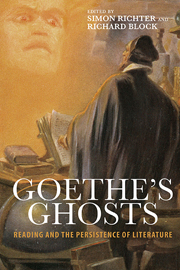Introduction—Ghosts and the Machine: Reading with Jane Brown
Published online by Cambridge University Press: 05 March 2014
Summary
Perhaps it isn't so foolish to wonder what the old men—Faust and his creator—thought about ghosts and those who see them.
—”Faust and the Gothic Novel,” 68My goal is that the ghosts be recognized and their insubstantiality welcomed into our discourse rather than left to haunt its margins.
—The Persistence of Allegory, 241Apartment 50 in Bolshaya Sadovaya ulitsa 302-bis in the Moscow of Mikhael Bulgakov's novel The Master and Margarita is known as the evil apartment. Behind its inconspicuous door the most incongruous and untoward events occur. On Walpurgis Night, the newly rejuvenated Margarita obliges the request of Woland, a mid-twentieth-century version of Goethe's Mephisto who appears to have strayed into Soviet-era Moscow, and agrees to serve as hostess to the ghostly souls who rise from hell for the festive occasion. The confines of the apartment prove elastic, easily expanding to absorb hundreds and thousands of guests and presenting them with an elegance unknown to Muscovites. Clad only with a necklace bearing the image of a black poodle, Margarita greets them all with easy grace. Among them is Frida, a young woman haunted by the daily appearance of a checkered table cloth like the one with which she suffocated her newborn infant, the result of a rape. The discrepancy between her plight and that of Goethe's Gretchen makes the allusion all the more pointed and poignant.
- Type
- Chapter
- Information
- Goethe's GhostsReading and the Persistence of Literature, pp. 1 - 14Publisher: Boydell & BrewerPrint publication year: 2013



